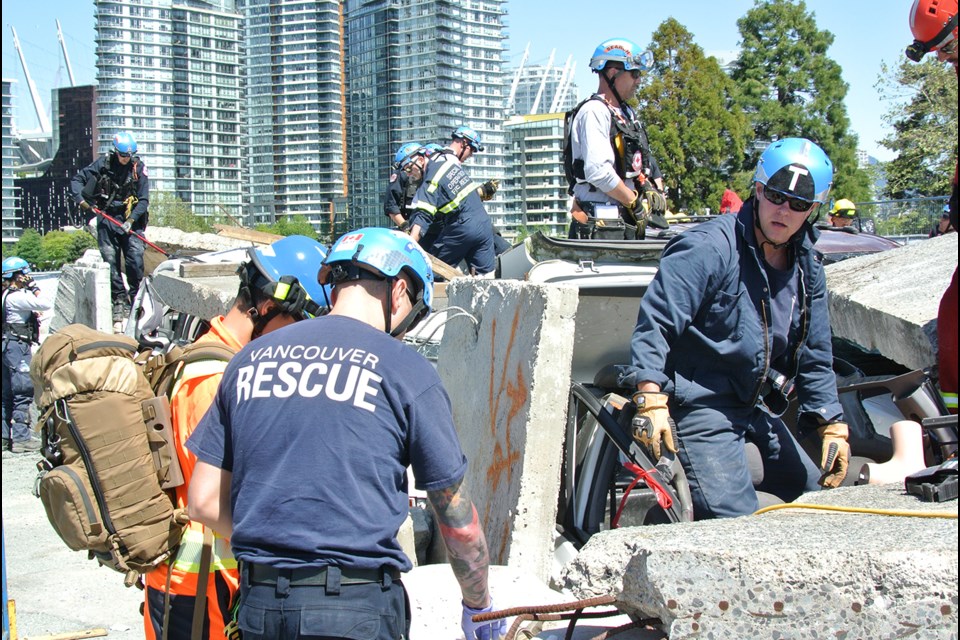Friday marked the city’s first-ever VanSlam event. No, it’s not some citywide poetry slam contest. As part of Emergency Preparedness Week, May 5 to 11, the City of Vancouver orchestrated a comprehensive emergency exercise to make sure the city is as ready as can be when the “big one” hits.
More than 600 city staff and volunteers took part in a day-long series of emergency response scenarios that were set to run until 9 p.m. at over 30 different sites across northeast Vancouver and the west side. All hands were on deck, including the police, fire and rescue, the city’s engineering department and even the military, to simulate a range of crisis responses, from recreation centre evacuations to search and rescue operations.
“Exercises such as this are a vital part of ensuring the city is ready to respond to major emergencies as they allow us to thoroughly assess the strength of our plans and identify areas where we need to focus on further development,” Vancouver Fire Chief Darrell Reid said in a press release earlier this week.
Located just east of the Cascadia Subduction Zone, Vancouver Island and the Lower Mainland remain at high risk of a large earthquake, known as a “megathrust quake,” as well as other smaller quakes, all which could wreak significant damage. According to the city, there is a one in four chance Vancouver will experience a “major” earthquake sometime in the next 50 years.
That’s why the city is working hard to ensure Vancouver’s emergency preparedness strategy is as coordinated as possible in the event of a major earthquake or any other natural disaster, said Capt. Jonathan Gormick, a spokesperson for Vancouver Fire Rescue.
“I think it would be putting our heads in the sand if we were to pretend like it's not going to happen,” Gormick said. “If it doesn't happen in your lifetime or my lifetime, I think we'll just consider that lucky.”
On a sweltering Friday afternoon, Gormick led the Vancouver Courier and other local media on a tour of a “disaster staging” site where members of Vancouver’s Heavy Urban Search and Rescue task force, a military regiment and fire rescue teams from outside Vancouver worked together in simulated rescue operations. Strengthening interoperability among the various organizations that are forced to work together in the wake of a disaster is a key focus of today’s exercise, Gormick said.
The first seismic-related scene recreated a major bridge collapse leaving several cars, and the people inside, crushed by rubble, while the second replicated a rock slide where massive boulders had pinned down vehicles as well as the passengers therein.
These “slow, methodical” rescue operations challenge first responders to think “outside of the box,” according to Gormick. The teams were only equipped with handheld power tools, physical strength and quick thinking, in order to save today’s victims – in this case, creepy looking dummies.
The city puts a lot of time and energy into emergency preparedness, said Gormick, a point that Mayor Kennedy Stewart emphasized earlier Friday afternoon. “People should feel confident that we’re as best prepared for an earthquake that we can be,” the mayor told the media.
But while that may be true of local government, that’s not necessarily the case among most regular citizens.
"We really hope that people take a bit of responsibility and, at the very least, prepare themselves for 72 hours without infrastructure for them and their family,” said Gormick. “You should have things like […] a grab and go bag in case somebody pounding on your door says, ‘You and your family have to get out now.’”
“It’s better to plan ahead, then wish you’d planned.”
This weekend, Neighbour Lab will be hosting two neighbourhood resilience walks “to help people understand the potential impacts of an earthquake on specific areas, find out about community strengths and opportunities, and discuss neighbourhood preparedness initiatives.”
For more information about preparing for a major emergency, visit vancouver.ca/beprepared.



